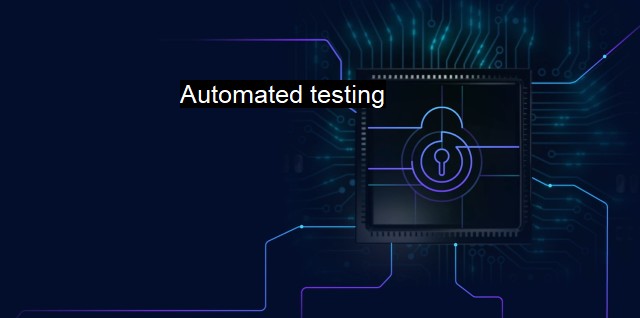What is Automated testing?
The Power of Automated Testing in Cybersecurity and Antivirus: Enhancing Effectiveness, Efficiency, and Accuracy to Protect Individuals and Organizations
Automated testing is a technique in software testing where tests are performed using automated software tools rather than being executed manually. It is vital in improving the efficiency, effectiveness, and coverage of the software testing process. It involves scripting and creating test scenarios and test data to validate the performance, functionality, and security of the system.Automated testing is an essential tool. An automated testing process can play a crucial role in identifying potential vulnerabilities and risks in a system or software. The automated tools can execute predefined tasks with high speed and precision to evaluate the system's robustness, thus promoting better security performance.
Automated testing can significantly speed up the process of testing in a cybersecurity environment. In manual testing, a tester has to go through each step: exploit a vulnerability, manipulate the system, assess the system responses, and then write a report about what happened. with automated testing, once the tests are designed and set, they can be run all at once, saving time, improving productivity, and reducing errors caused during manual exploitation.
Automated testing can validate the entirety of systems, servers, networks, and applications to detect flaws from various angles. It helps identify correlating patterns or sequences that might not get revealed during manual testing. This process provides a broader scope of vulnerability detection, essential in maintaining robust cybersecurity measures.
In case of antivirus testing, automated testing becomes even more necessary. Antivirus programs operate by scanning the entire system, identifying malicious code or potentially harmful software, and removing or quarantining it. As the threats to systems change and grow more sophisticated every day, an automated testing process allows software creators to ensure that their antivirus can handle these new threats in an optimal way.
It helps set up different test scenarios - like updating the antivirus software to the latest definitions, running a full system scan, setting up files with deliberately malicious codes, and seeing how the antivirus software reacts. The test can be designed to closely mimic actions taken by real-world users such as downloading software, browsing certain websites, or opening emails. It could also simulate some dangerous hacking and virus spread attempts.
Automated testing is also helpful for regression testing in antivirus software. Regression testing verifies that the previously developed and tested software still works after a change or an update. In antivirus applications, automated testing can ensure that updating virus definitions or changing even minor software features doesn’t affect the performance and security provided by the software.
By testing different scenarios and actions exhaustively and continuously, companies can learn and predict how their antivirus software will respond when faced with certain situations or threats. Through this understanding, antivirus software can be made more effective, more secure, and more efficient.
With the rise of newer, smarter, and more dangerous forms of cybersecurity threats, automated testing's role has become even more relevant. Through the use of machine learning algorithms, automated testing can also adapt and learn from the test they execute, refining their future tests and getting 'smarter' in the process – weathering down the evolving threat landscape.
Thus, automated testing is a vital aspect of cybersecurity and antivirus. It provides numerous benefits, including increased speed and efficiency of testing, improved test coverage, eliminating human error, and freeing up resources for high-level tasks. When adequately implemented and managed, it facilitates comprehensive testing that strengthens the security and improves the performance of the complete system while ensuring that cybersecurity standards are adhered to, considering the rapidly evolving digital threats. It indeed is an indispensable tool in the cybersecurity realm, increasing the overall company safeguarding and digital resilience.

Automated testing FAQs
What is automated testing in cybersecurity?
Automated testing in cybersecurity is the use of software tools and scripts to streamline and automate the process of testing the security of a software or system.What are the benefits of automated testing in cybersecurity?
Automated testing in cybersecurity helps to identify vulnerabilities and weaknesses in systems, applications, and networks more quickly and efficiently than manual testing. It also enables organizations to test their systems more frequently, ensuring that they are always up-to-date with the latest security standards.What types of testing can be automated in cybersecurity?
There are several types of testing that can be automated in cybersecurity, including security scanning, vulnerability assessment, penetration testing, and compliance testing. Each of these types of testing helps to identify different types of security risks and threats.How does automated testing help in antivirus development?
Automated testing helps in antivirus development by enabling developers to quickly and efficiently test their software for vulnerabilities and weaknesses. It also allows them to test their software against the latest malware and virus threats in a safe and controlled environment, ensuring that their antivirus software is always up-to-date and effective.| | A | | | B | | | C | | | D | | | E | | | F | | | G | | | H | | | I | | | J | | | K | | | L | | | M | |
| | N | | | O | | | P | | | Q | | | R | | | S | | | T | | | U | | | V | | | W | | | X | | | Y | | | Z | |
| | 1 | | | 2 | | | 3 | | | 4 | | | 7 | | | 8 | | |||||||